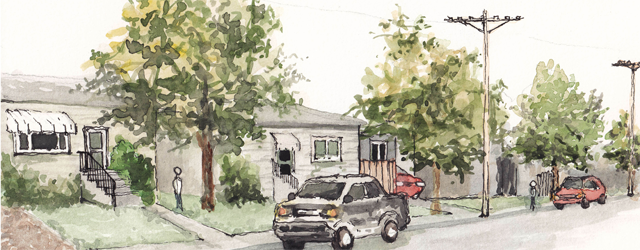Graduates from the University of Regina have envisioned a practical path forward for global governance. Hailing from across Saskatchewan, they banded together in 2017 in the hopes that fresh eyes and hard work could improve the state of world politics.
Tag: Saskatchewan
Regina’s Rooming Houses debate
The City of Regina has recently begun consulting residents about the subject of “Rooming Houses,” which are homes in residential areas in which both the owner and renters are residing. If all renters in a home are relatives, then it is not a Rooming House.1 The City has asked that comments on the subject be […]
Response to Design Regina Draft Documents
Preface This document is a response to the draft documents posted as part of the Design Regina process. The authors of this response are also the primary authors of Transforming Regina: Planning for 2040 and beyond, which achieved a place in the finals of the Regina Morph My City competition. Readers interested in a detailed […]
Harvest and Hunger: Amy Jo Ehman on local food choices
Hello! This is my first post on Vision of Earth. Glad to be here. On November 9th & 10th, SCIC (Saskatchewan Council for International Cooperation) hosted an event in Saskatoon called Harvest and Hunger (introduced in our earlier post: Harvest and Hunger: Brainstorming the future of the world food system). SCIC is an umbrella organization that represents […]
Harvest and Hunger: Brainstorming the future of the world food system
Harvest and Hunger The Saskatchewan Council for International Cooperation is hosting an event in Saskatoon on November 10th called Harvest and Hunger. The event sets out to answer three questions: Who controls the world’s food? Who has power in the global food system? Who doesn’t? What are people doing – both in Saskatchewan and around […]

Vision of Earth submission chosen as finalist in Morph My City Competition
Vision of Earth has been selected as a finalist in the Regina Morph My City competition. We’ll be presenting our work at the National Infrastructure Summit and releasing all of it to the public.
Ben’s Interview on Radio CKUT 90.3 FM
Ben Harack was interviewed on the Ecolibrium radio show on CKUT in Montreal. Topics were Moving Planet, Saskatchewan’s sustainability, and peer-based cross-disciplinary efforts towards sustainability.
John Klein: Social involvement and sustainability in Regina, Saskatchewan, and Canada
John Klein is a notable blogger and community activist in Regina, Saskatchewan. Here he answers our philosophical and practical questions about the most important issues facing our society today, and what each of us can do about them.

A renewed look at 2010, a sustainable vision for 2011
Here we review major renewable energy topics from 2010 and then turn towards analyzing energy issues for 2011 and beyond.

Curtis Dorosh: Green living, building, and volunteering
How to live green? Build green buildings? Put our efforts towards a better future? Curtis Dorosh has spent much of his life trying to answer these questions. Collected here are some of his answers.
Power system performance metrics
Everything has its price. Every form of power production has costs in dollars, time, land, materials, pollutants, greenhouse gas emissions, and human deaths. We look at the most important factors for analyzing the feasibility of a proposed power project. Considering only some of these factors will lead to an incomplete picture of power system costs.
Feed-in tariffs: A fitting policy for renewable energy
Here we talk about what a feed in tariff is and how it works. We also conduct an overview of how effective feed in tariffs have been at stimulating the renewable energy industry around the world.
How can renewables deliver dispatchable power on demand?
What does dispatchable mean? Why is it important? How do we currently do this? Can renewable energy fulfill this role? What other tricks can we use?
Types of hydroelectric power: How do the dam things work?
Hydroelectricity, or ‘hydro’, is generated from the energy in the water cycle of the earth. The sun evaporates water on the surface of the earth, causing it to rise up to form clouds. Clouds eventually form droplets, which then rain, snow, or hail down to the surface. Water on the surface flows downhill until it evaporates again. During this time it may become trapped in glaciers, lakes, ponds, puddles, or the ocean. Driven by the sun, the water cycle is a truly renewable resource.
Jim Elliott shares his thoughts on sustainability, community, and living green
Jim Elliott is a notable figure in the sustainability movement in Regina and Saskatchewan. He is involved with many environmental action groups, poverty-reduction groups, and the Citizen’s Public Transit Coalition for Regina.
Reservoir hydro resources on the Canadian prairies
We have been captivated for a long time by the intriguing possibilities inherent in combining Manitoba’s extensive hydro resources with Saskatchewan’s high-quality wind power. A number of other groups in Saskatchewan have been lobbying for greater interconnection between the two power grids to take advantage of the natural synergy that exists between wind power and reservoir-based hydro power.

Publicly Administered Green Energy Futures
Our goal is to keep our physical power infrastructure publicly owned, but gain some of the advantages of the private sector. The key to our recommendation is voluntary public investment from the people of Saskatchewan. In order to stimulate new renewable energy construction, we recommend that SaskPower open up renewable energy projects for direct public investment.

Personal and social change for a green energy future
The question is: what can we do to be more in harmony with the environment? The answers we present here are intended to be practical pieces of an answer to that question.

Publicly Owned Renewable Energy
We want the ability to directly support the development of renewable electricity generation. We don’t just mean buying GreenPower from sources that already exist. We want to be able to choose to put our money out there so that these things can actually happen. We want to support projects that haven’t yet been built, or even started.
Feed-In Tariff: Government Encouraging The Market
The feed-in tariff is a well known policy mechanism in the area of electricity generation. It has been applied in many countries with the intent of encouraging the development of renewable power generation. Such a policy typically involves guaranteeing to desired types of generation both subsidized long term prices for electricity and guaranteed grid access. This policy has been well utilized notably in Germany and Spain, where residents have seen very stable electricity prices coupled with tremendous growth of the renewable energy sector of their economies.